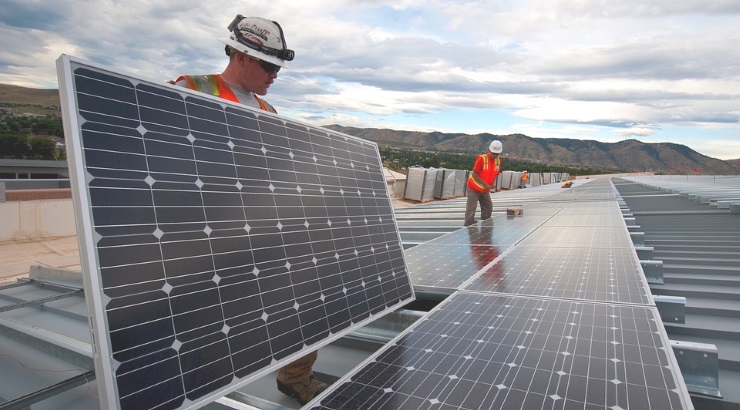Energy Efficiency
Inside Kenya’s Small-Scale Solar Energy Revolution
Companies are increasingly shifting to own-generated solar power.

Demand for solar energy in Kenya has risen over the past few years as power consumers embrace the installation of solar power systems to beat the high cost of electricity.
According to electricity distributor Kenya Power, a growing number of large power customers – who account for about 68% of its sales revenues, have shifted to own-generated solar power, dealing a major blow to its already declining incomes.
Domestic consumers are also embracing solar power installation with the 2019 census report putting solar lighting uptake in Kenya homes at 19.3%, about 2.3 million homes.
Indeed, rural areas reported a 29.9% uptake of solar lighting – higher than the rural national grid connection which stood at 26% during the August 2019 census.
Kenya is endowed with a yearlong supply of ample sunshine which makes it easy to operate both small-scale and large-scale solar power systems within the country.
East Africa Breweries PLC has become the latest big power consumer to signal its shift to alternative power solutions with plans to set up a Sh22 billion solar power plant.
The brewer is targeting to completely delink from Kenya Power by 2030.
Patrick Mbugua, the GM of Wildfire Flowers – which has installed a 154Kw solar plant at its farm in Naivasha, recently said the shift to solar energy has helped his company to reduce its dependence on national grid power, which is quite expensive.
“The payback period is four years and the guarantee for the solar panels is 20 years, meaning we will be getting free power from the fifth year onwards,” Mr Mbugua said.
Reliable power supply
Wildfire Flowers is following in the footsteps of companies and institutions that have shifted to solar photovoltaic (PV) grid-tied systems for cheaper and reliable power supply.
The International Centre of Insect Physiology and Ecology (Icipe), Garden City Mall, and the Africa Logistics Properties (ALP) have commissioned solar plants at their premises.
In September 2018, Icipe commissioned two solar PV power plants that were installed at its premises in Kasarani, Nairobi, and on the shores of Lake Victoria for Sh275 million.
In the same month, Solarcentury installed a 506 kilowatt peak (kWp) hybrid solar PV at ALP’s flagship development at Tatu City in Ruiru.
The logistics firm hopes to save Sh12 million a year in power bills.
RELATED: Kilifi’s Biggest-Ever Solar Power Plant Goes Live
Garden City Mall has installed a Sh209 million solar carport with a capacity to produce 1,256-megawatt hours yearly from the 3,300 solar panels mounted on the rooftop parking.
The solar carport is helping Garden City to save about Sh31.6 million annually.
Cut energy costs
London Distillers Ltd has also installed a 1 MWp roof solar system at its factory in Athi River, offsetting the need for grid power and cutting energy costs by Sh18 million a year.
Williamson Tea has equally made the shift by installing a 1MW solar farm in Changoi Tea Factory in Bomet, slashing its energy bills by 30%.
Strathmore University (SU) and Kenyatta University (KU) are leading universities in shifting to renewable energy. In 2014, SU installed a 600Kw rooftop PV solar plant at its main campus in Madaraka Estate to power its operations and earn some income by selling excess power.
In December 2018, KU switched on the first phase of its Sh1.7bn solar plant which will help it generate electricity for its operations with the excess power offloaded to the national grid.
RELATED: Devki Unveils East Africa’s Largest Rooftop Solar Plant
Earlier this year, Ecobank signed a deal with Distributed Power Africa to install solar power systems in its seven branches as it seeks a cheaper and more reliable power supply.
Two Rivers Mall on Limuru Road, Bidco, Total and Kapa Oil Refineries are already on solar, with Mombasa International Airport lining up to join the solar movement.
Carbon dioxide
Mombasa International Airport is setting up a ground-mounted 500 KW solar PV system, which can generate 820,000 kWh and offset 1,300 tonnes of carbon dioxide annually.
Kapa Oil Refineries recently sought regulatory approval to raise its solar PV grid-tied system capacity from 1.5MW to 2.5MW to meet its rising energy demand.
Interestingly, Kenya Power has also joined the solar movement.
The company says it will contract private firms to install solar panels for interested customers under a design-build-finance and operate the model.
RELATED: KenGen to Build 42.5MW Solar Plant at Seven Forks
“KPLC will undertake the role of project development by liaising with interested commercial and industrial customers who will provide rooftop space or ground space for installation of the PV (photovoltaic) modules,” Kenya Power said in an earlier press statement.
“A private sector investor will then be selected competitively through a request for proposal (RFP) to develop and operate the grid-tied captive solar plants at the customer premises.”
The electricity distributor will then sell the generated power at a discounted rate to the owners of the premises hosting the solar plant.
Excess power will be sold to adjacent customers at regular rates.
The solar plant will remain the property of Kenya Power and the private firms installing it.














